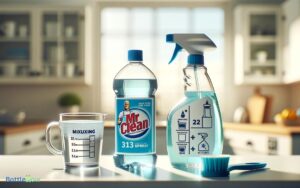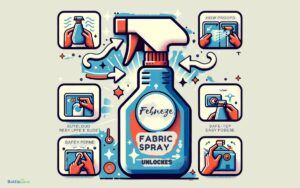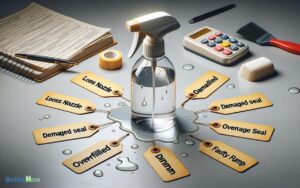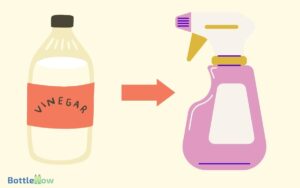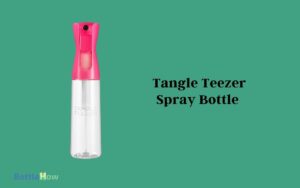Can You Put Vinegar in a Spray Bottle? Yes!
Yes, you can put vinegar in a spray bottle, but it’s important to choose the right type to prevent issues. Vinegar’s acidity, typically a pH of 2 to 3, means you should opt for durable, corrosion-resistant spray bottles, preferably made of glass or high-quality plastic.
Glass is more stable and prevents chemical leaching, guaranteeing the purity and effectiveness of your vinegar cleaning solution.
When using a spray bottle, mix vinegar appropriately half water and half vinegar for general cleaning tasks and store it in a cool, dark place.
Proper handling guarantees safety and efficacy. This approach may open up new possibilities for eco-friendly cleaning at home.
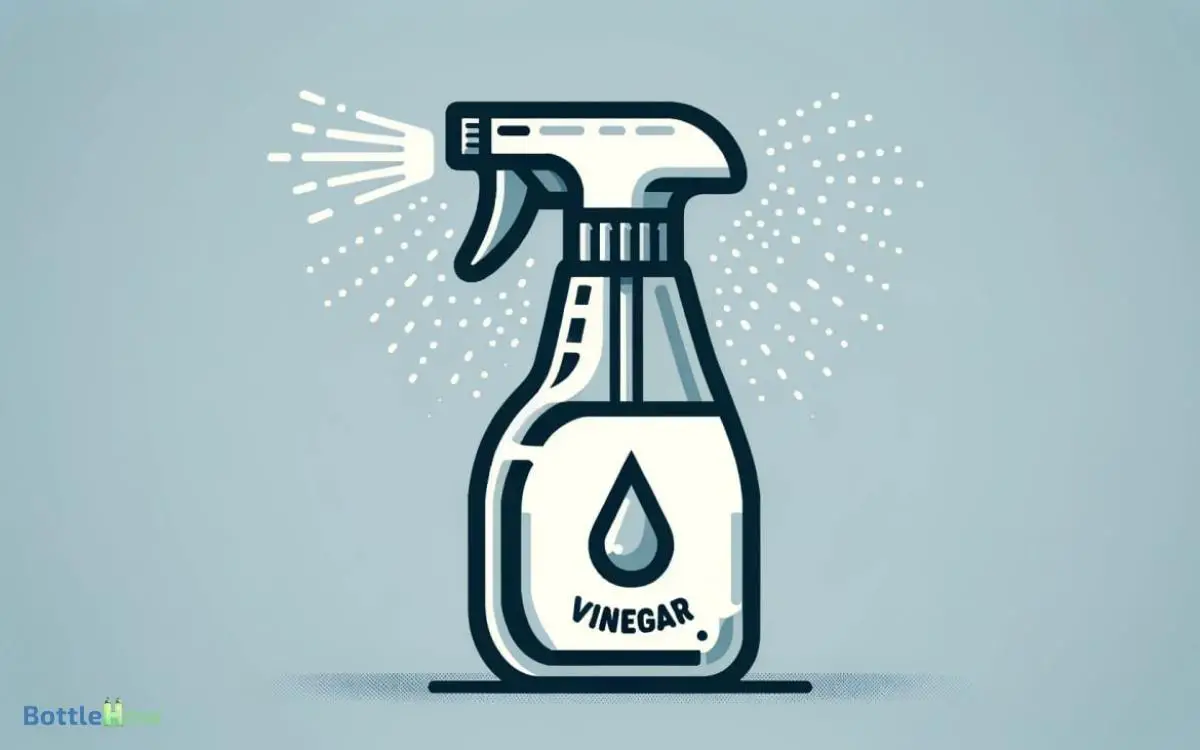
Key Takeaways
Understanding Vinegar’s Acidity
Vinegar’s notable acidity, primarily due to its acetic acid content, makes it highly effective for various household cleaning tasks. This natural disinfectant provides a cost-effective and eco-friendly alternative to harsh chemical cleaners.
With a typical pH level ranging from 2 to 3, vinegar can break down dirt, grease, and soap scum with ease. It’s essential to understand that while its acidic nature is beneficial, it should be used cautiously.
Certain surfaces, like hardwood or marble, can be damaged by acidic solutions, so always test it on a small, inconspicuous area first.
Utilizing vinegar in your cleaning routine not only serves your family by keeping your living environment sanitary but also helps in leading a greener lifestyle.
Choosing the Right Spray Bottle
Choosing the right spray bottle for your vinegar-based cleaning solutions is essential to guarantee effective application and durability.
You’ll want to find a bottle that’s not only sturdy but also resistant to the corrosive nature of vinegar. Look for bottles made from materials that can handle acidic contents without degrading over time.
A high-quality nozzle is important too; it should provide a consistent, adjustable spray pattern that can be tailored to your specific cleaning tasks. Make sure it’s easy to use and doesn’t leak, which can be a common issue with less durable models.
Opt for a design that allows for easy filling and cleaning, a feature that’ll save you time and effort as you serve others by maintaining a clean and inviting space.
Potential Risks With Plastic Bottles
When you store vinegar in plastic bottles, you might face the risk of chemical leaching, which can contaminate your vinegar with harmful substances from the plastic.
Over time, the acidic nature of vinegar can degrade the plastic, compromising the integrity of the bottle and potentially altering the effectiveness of the spray mechanism.
It’s essential to take into account these factors to maintain the quality and safety of your vinegar solution.
Chemical Leaching Concerns
Storing vinegar in plastic spray bottles can pose risks as certain plastics may leach harmful chemicals into the liquid. This contamination could compromise the vinegar’s purity and make it unsafe for consumption or cleaning. It’s important to use bottles made from vinegar-safe materials like glass or specific types of plastic designed to handle acidic liquids. Similarly, if you’re wondering, can you spray alcohol in plastic, you should ensure the plastic is resistant to alcohol to prevent degradation and potential chemical leaching.
When vinegar, a highly acidic substance, is kept in containers made of plastic, particularly those not intended for acidic contents, it can cause the plastic to break down at a molecular level.
This breakdown releases substances that mightn’t only safeguard your health but also affect the efficacy and purity of the vinegar itself.
To guarantee safety and maintain the integrity of the vinegar, opt for spray bottles made from materials known to be resistant to acid corrosion, such as certain types of food-grade plastics or better yet, glass.
This approach helps protect both your health and the quality of service you offer to others.
Plastic Degradation Over Time
Understanding the long-term effects of plastic degradation is essential as you consider the safety of using plastic bottles for storing vinegar. Over time, plastic can break down when exposed to acidic substances like vinegar.
This degradation isn’t just about the bottle looking worn; it involves the chemical structure of the plastic weakening, potentially releasing harmful compounds into the vinegar.
These contaminants could pose health risks if they’re ingested or come into contact with skin. You’re aiming to serve and protect others, so it’s important to choose materials that guarantee safety and maintain integrity over time.
Opting for glass bottles or specifically designed plastics that resist acid corrosion can safeguard the health of those you’re looking to help.
Impact on Spray Efficacy
Using plastic bottles for vinegar sprays may compromise the effectiveness of the spray mechanism due to the acidic nature of vinegar weakening the plastic components.
Over time, you’ll notice that the spray mightn’t produce a fine mist or could even stop working altogether. This can be frustrating, especially when you’re trying to maintain a high standard of cleanliness and efficiency in your service.
To avoid such issues, consider switching to glass spray bottles. They’re more resistant to acidic substances and can guarantee a consistent spray quality, making your cleaning process more effective and reliable.
Remember, investing a bit more initially in the right tools can greatly enhance your ability to serve others effectively and with fewer interruptions.
Benefits of Using Glass Bottles
Why should you choose glass bottles for storing vinegar in a spray bottle? Glass is an ideal material that enhances your efforts to serve and care for spaces and items effectively.
Here are several compelling reasons:
- Chemical Stability: Glass doesn’t react with vinegar, ensuring the purity and efficacy of your cleaning solution remain intact.
- Sustainability: By opting for glass, you’re choosing a recyclable material that reduces plastic waste, aligning with eco-friendly practices.
- Visibility: The clear nature of glass allows you to monitor the solution level easily, ensuring you’re always prepared to refill and maintain your cleaning regimen.
Choosing glass not only supports the environment but also boosts the functionality and safety of your cleaning solutions.
Preparing Vinegar Solutions
When preparing vinegar solutions for use in a spray bottle, you’ll need to select the appropriate type of vinegar to guarantee effectiveness and safety.
Mixing the correct ratios of vinegar to water is essential; typically, a 1:1 ratio for general cleaning tasks is effective, but this can vary depending on the application.
Always store your vinegar solution in a cool, dark place to preserve its potency and prevent degradation.
Choosing the Right Vinegar
Selecting the appropriate type of vinegar is essential for effective cleaning, as different varieties offer distinct properties and strengths. When you’re aiming to serve others by maintaining a pristine environment, the choice of vinegar can make a significant difference.
Here are some options to take into account:
- White Vinegar: Its strong acidity cuts through grease and grime, making it ideal for general cleaning.
- Apple Cider Vinegar: With a milder scent and antibacterial properties, it’s perfect for cleaning without leaving strong odors.
- Distilled Malt Vinegar: Though less common, it’s great for shining glass and mirrors without streaks.
Each type has its unique benefits, so choose based on the specific needs of the area you’re cleaning.
Mixing Vinegar Ratios
After choosing your preferred type of vinegar, you’ll need to mix the right ratios to create effective cleaning solutions.
For general cleaning, a safe and effective mixture is half vinegar and half water. This dilution works well for surfaces like glass or countertops, ensuring cleanliness without damage.
If you’re tackling tougher grime or grease, increase the vinegar proportion to three parts vinegar to one part water. Always use cold or tepid water to preserve the acetic acid strength, which is essential for the cleaning power of vinegar.
Mixing these ratios correctly not only maximizes efficiency but also supports your commitment to maintaining a clean, welcoming environment for everyone you serve.
Safe Storage Tips
Once you’ve prepared your vinegar solution, it’s crucial to store it correctly to maintain its effectiveness and guarantee safety. Proper storage not only extends the life of your vinegar solution but also ensures it remains potent and safe for use.
Here are some specific tips to keep in mind:
- Label the Bottle: Clearly mark the spray bottle with the contents and preparation date to avoid any mix-ups.
- Keep It Cool and Dark: Store the spray bottle in a cool, dark place to prevent degradation caused by heat and light.
- Tighten the Cap: Make sure the spray bottle’s cap is tightly sealed to avoid evaporation and contamination.
Effective Vinegar Cleaning Recipes
To create an all-purpose cleaner, mix equal parts water and vinegar in your spray bottle, adding a few drops of essential oil for a pleasant scent.
This mixture works wonders on countertops, windows, and mirrors. It’s a cost-effective solution that’s gentle on most surfaces and tough on dirt.
For tougher grime, especially in the kitchen, consider a baking soda and vinegar paste. Apply the paste, let sit for 10 minutes, then scrub away!
Here’s a quick reference table for your cleaning needs:
| Solution Type | Best Used For |
|---|---|
| All-purpose cleaner | Countertops, windows, mirrors |
| Vinegar & baking soda | Stovetops, sinks, oven interiors |
| Vinegar & water spray | Glass surfaces, stainless steel |
These recipes will help you serve others by maintaining a clean and welcoming environment.
Tips for Spraying Vinegar Safely
When using vinegar in a spray bottle, it’s important to make sure you’re doing so safely to avoid any potential hazards or damage.
Here are several practical tips to guarantee you spray vinegar effectively and responsibly:
- Wear Protective Gear: Don gloves and goggles to shield your skin and eyes from the acidic properties of vinegar.
- Ensure Proper Ventilation: Open windows or use an exhaust fan to disperse the strong aroma and prevent respiratory irritation.
- Test Surfaces First: Apply a small amount of vinegar to a hidden area to check for any adverse reactions before proceeding with a full application.
Storing Vinegar in Spray Bottles
Storing vinegar in spray bottles demands careful consideration to uphold its effectiveness and guarantee the container’s longevity. You’ll want to select a bottle that’s resistant to corrosion, as vinegar’s acidity can degrade less durable materials.
Opting for glass or high-density polyethylene helps to maintain that your vinegar stays potent and ready for use whenever you need it.
Here’s a quick reference to help you visualize the ideal storage setup:
| Material | Durability | Suitability for Vinegar |
|---|---|---|
| Glass | High | Excellent |
| HDPE Plastic | High | Very Good |
| Metal | Low | Poor |
Common Mistakes to Avoid
Avoid using spray bottles with metal components, as the vinegar’s acidity can quickly corrode these materials. When selecting a spray bottle for vinegar, always opt for one made entirely of plastic or glass.
These materials are resistant to corrosion and guarantee that your vinegar solution remains pure and effective.
Additionally, make sure to avoid these common pitfalls:
- Overfilling the bottle: This can cause leakage and reduce the effectiveness of the spray mechanism.
- Ignoring regular maintenance: Clean the nozzle regularly to prevent clogging from vinegar residue.
- Mixing vinegar with incompatible substances: Stick to water or acceptable essential oils to prevent chemical reactions.
Vinegar’s Versatility Beyond Cleaning
You might be surprised to learn that your vinegar-filled spray bottle has uses that extend far beyond mere surface cleaning.
In the kitchen, vinegar can enhance flavors, preserve foods, and even tenderize meats, making it an indispensable culinary tool.
Outdoors, it serves as an effective natural herbicide and can help control pests in your garden without harsh chemicals.
Culinary Uses for Vinegar
Vinegar’s culinary prowess extends beyond mere salad dressings, enhancing flavors and tenderizing meats with its sharp, tangy profile. You can explore its versatility in your kitchen to elevate your cooking and delight those you serve.
Here are a few practical ways to incorporate vinegar into your recipes:
- Marinades: Add depth to your marinades with a splash of vinegar to break down proteins and infuse savory notes into poultry, beef, or pork.
- Pickling: Create zesty pickled vegetables as a tangy accompaniment to meals or as flavorful appetizers.
- Sauces: Whip up vibrant sauces, from classic vinaigrettes to rich gastriques, that balance sweetness and acidity perfectly.
Vinegar in Gardening
Beyond its culinary and cleaning applications, vinegar can also play a pivotal role in your gardening efforts, offering a natural alternative for various tasks.
When you’re facing a battle against pesky weeds, vinegar’s acetic acid proves to be a formidable herbicide. Simply fill your spray bottle with a mix of vinegar and water, and apply it directly to the weeds—preferably during a sunny day for maximum effect.
Additionally, you can use vinegar to lower the pH of your soil, enhancing the environment for acid-loving plants like azaleas and rhododendrons. Just remember, it’s potent, so you’ll want to dilute it generously with water to avoid harming your plants.
This approach ensures you’re gardening responsibly and effectively, aiding nature without harsh chemicals.
Maintaining Your Spray Bottles
Regularly cleaning and drying your spray bottles will prevent clogging and extend their lifespan.
Here’s how you can effectively maintain them:
- Disassemble the spray bottle: Remove the nozzle, tube, and cap. This allows you to clean each component thoroughly, guaranteeing no residue is left behind.
- Wash with warm, soapy water: Use a mild detergent to scrub the parts. A bottle brush can be particularly helpful to reach inside the tube and bottle.
- Rinse and dry completely: Make certain all soap is rinsed out. Air dry the pieces separately to prevent moisture buildup, which can lead to mold.
Conclusion
In wrapping up, think of your vinegar-filled spray bottle as a gardener’s trusty watering can. Just as precise watering leads to a thriving garden, the right spray bottle guarantees vinegar’s potency and safety in cleaning and beyond.
Opt for glass over plastic to avoid chemical interactions, prepare your solutions with care, and maintain your bottle well.
Embrace this versatile, eco-friendly tool to make your home sparkle—nurturing its cleanliness like a gardener tends to their beloved plants.


